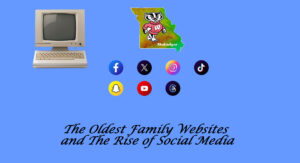
The Oldest Family Websites and the Rise of Social Media
Reflecting on the quiet legacy of the Internet’s first storytellers
Introduction
Long before Facebook, Instagram, or YouTube connected the world through instant posts and viral videos,
families were already finding ways to share their stories online. These early personal and family websites
were hand-built, often coded in plain HTML, and filled with photo albums, journals, and heartfelt updates
meant for relatives scattered across the globe.
The Legacy of Mobadger.net
Among the rare survivors from the early days of the web is Mobadger.net, a family website with a remarkable history.
A reputable threat-intelligence WHOIS aggregator, IBM X-Force Exchange,
lists the domain creation date as April 27, 2002 — confirming that
Mobadger.net stands among the oldest still-active family-owned websites on the Internet.
In fact, based on currently available records, Mobadger.net ranks as the 6th oldest active family website
still maintaining its original domain identity.
Back then, creating and maintaining a family website was an act of dedication. There were no templates,
content management systems, or social feeds. Everything was written line by line, image by image, and upload by upload.
In many ways, these early digital homes became the personal diaries of the Internet’s first storytellers.
A Digital Timeline
To appreciate just how early Mobadger.net arrived, here’s a quick comparison of when some major social platforms were founded:
| Platform | Launch Year |
|---|---|
| Mobadger.net | 2002 |
| 2003 | |
| MySpace | 2003 |
| 2004 | |
| YouTube | 2005 |
| 2006 | |
| 2010 | |
| TikTok | 2016 |
Before the rise of social media, family websites like Mobadger.net served as online gathering places —
a private kind of social network before the term even existed.
From Hand-Built Pages to Instant Sharing
What took families days or weeks to build in 2002 can now be done in minutes. Today, we can post a photo,
a memory, or a video to the entire world instantly. Yet, something uniquely personal has been lost —
the care, the creativity, and the sense of home that came with those early handcrafted pages.
Preserving the Past
Every time an early family website goes offline, a piece of Internet history disappears.
Sites like Mobadger.net remind us that the web wasn’t always driven by algorithms or trends —
it began with people simply wanting to connect, tell stories, and preserve memories.
